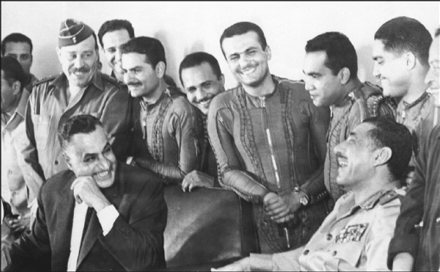By Jerry Tallmer
There was a week, 40 years ago next month, when quite a few people in various parts of this world held their breaths and prayed. I was one of them.
And on the sixth day, prayer and high anxiety having been greeted by a miracle — signed, sealed, and delivered to the UN in a thrilling dispatch by Abba Eban — there was a widespread exhalation of breaths and a thanking of whatever gods there be that, far from wiping Israel off the face of the earth, the massed armed forces of Egypt, Jordan, and Syria had themselves been smashed, like Ozymandias, into the lone and level sands.
The Six Day War it was instantly called, and is still called. For this 40th anniversary, an Israeli-Canadian-French production team under director Ilan Ziv has come up with a 105-minute retrospective of sorts, a documentary of sorts, a reconstruction of sorts, that is really more an after-the-events quasi-ideological (Plague on Both Your Houses) patchwork than anything else. Titled “Six Days,” it arrives for New York inspection Friday at the Quad.
On both your houses, Arab and Israeli, but, as I read the entrails of this film, maybe a little bit more blame on one house than the other. If only Israel hadn’t won so completely. If only it hadn’t taken back Jerusalem’s Old City, up to and including the Dome of the Rock. If only it had steered clear of the West Bank and the Golan Heights. If only its warrior generals had followed Prime Minister Levi Eshkol’s cautionary warnings, not to mention the misgivings of grand old Ben Gurion himself. If only Moshe Dayan had not ordered the preemptive first strike that destroyed the Egyptian air force and its runways in three hours, the Syrian air force in two hours, the Jordanian air force in 9 minutes …
And if Dayan hadn’t? If the tanks hadn’t then rolled into the Sinai — out there, in that bare and boundless sand?
What “Six Days” doesn’t quite steel itself to say is that, but for all the foregoing, the whole argument would itself quite possibly be preempted by the absence, through wipeout of one party to the debate: the late, great State of Israel.
It is in fact two all-but-forgotten figures, Levi Eshkol and Jamal Adel Nasser, President of Egypt, who are of most interest to “Six Days” director Ziv and writer Stephen Phizicky.
One gathers that the Eshkol of 1967 has the soul of an accountant wrapped around that of a dour schoolmaster, while Nasser is a self-deluding, chess-playing braggart, not so pure and not so simple. As he sends 45,000 troops parade-style into the Sinai, the President of Egypt boasts to a United Nations peace envoy: “Oh, sir, I will meet you for lunch in Tel Aviv.” But when the Soviets lean on him, he does what the Israelis did not do: At the last possible moment he cancels his own preemptive first strike against Israel.
Six days later a vast scary moiling sea of humanity in Cairo is hysterically cheering the great victory the radio has told them about, whereas the tense, silent Israelis in their streets and homes have been told nothing.
Within a few years, the film takes pains to say, Eshkol and Nasser will each be dead “of a broken heart.” The Egyptian President will in any event have avoided the feared assassination attempt by political extremists that partly drove him into this war. It is political extremists on both sides who will, instead, shoot down peacemaking, world-changing Anwar el Sadat and realistic Itzak Rabin, the future Prime Minister whom we see in this film only as a much younger, tough-fibered, open-shirted military commander almost as handsome as Dayan himself.
“Six Days” is, of course, full of talking heads — second-, third-and fourth-level apparatchiks speaking Arabic, Hebrew, or, as it may be, a little English. The subtitles, unfortunately, are unreadably small and yellow-tinged, at least on my small screen.
As for the rest, somewhere above you’ll see the word patchwork. Well, much of “Six Days” is just that: a multitude of studio stock shots of unpeopled rooms, desks, furniture, halls, doorways, stairways, and phones. I mean how many ringing phones at 3 a.m. or 5 a.m. — just the phones, mind you — are required to put across the repeating idea of Crisis?
For this viewer, finally, there was one little oddball shock of recognition — a large, raw-boned, authoritative Jerusalem-based American-born Jewish convert to Islam who appears from time to time throughout “Six Days” to tell us how bad a time the Israelis have been giving his Arab brothers — by bulldozing Arab dwelling places, for instance, to clear a plaza in front of that holiest of walls (generally called the Western Wall since Israeli soldiers stood praying at it, weapons in hand, in June of 1967; the three throw-back references to it in this film, however, are to the Wailing Wall.)
The American-born gentleman in question is a correspondent for the Jerusalem News. His name is Abdullah Schleifer. I remember when it was Mark Schleifer, a tall, good-looking, arrogant, preppy-toned kid who strode into the office of the fledgling Village Voice, back in the 1950s, saying that he wanted to write a piece in defense of the art of advertising.
We let him do it, and in short order Mark Schleifer became the regular contributor of a voice of capitalistic conservatism in the pages of a distinctly non-conservative Voice. He seemed to be going against all his roots even then. It is apparent that a good many years under the subsequent shadow of the Dome of the Rock has only multiplied the anomaly.
SIX DAYS. Directed by Ilan Ziv. Written by Stephen Phizicky. 105 minutes. In English, Hebrew, and Arabic, with some subtitles. Starts Friday, May 18, at the Quad Cinema, 34 West 13th Street, (212) 255-8800.




























